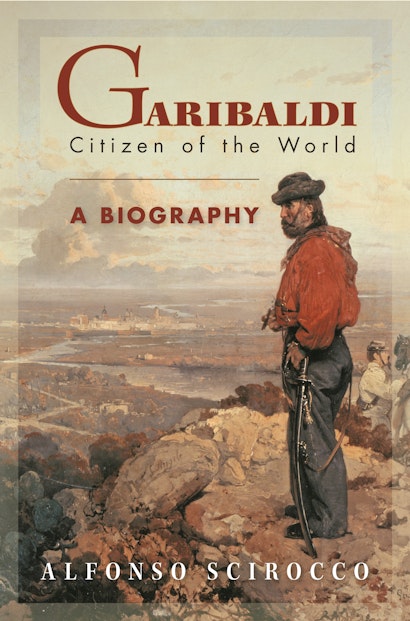What adventure novelist could have invented the life of Giuseppe Garibaldi? The revolutionary, soldier, politician, and greatest figure in the fight for Italian unification, Garibaldi (1807-1882) brought off almost as many dramatic exploits in the Americas as he did in Europe, becoming an international freedom fighter, earning the title of the “hero of two worlds,” and making himself perhaps the most famous and beloved man of his century. Alfonso Scirocco’s Garibaldi is the most up-to-date, authoritative, comprehensive, and convincing biography of Garibaldi yet written. In vivid narrative style and unprecedented detail, and drawing on many new sources that shed fresh light on important events, Scirocco tells the full story of Garibaldi’s fascinating public and private life, separating its myth-like reality from the outright myths that have surrounded Garibaldi since his own day.
Scirocco tells how Garibaldi devoted his energies to the liberation of Italians and other oppressed peoples. Sentenced to death for his role in an abortive Genoese insurrection in 1834, Garibaldi fled to South America, where he joined two successive fights for independence—Rio Grande do Sul’s against Brazil and Uruguay’s against Argentina. He returned to Italy in 1848 to again fight for Italian independence, leading seven more campaigns, including the spectacular capture of Sicily. During the American Civil War, Abraham Lincoln even offered to make him a general in the Union army.
Presenting Garibaldi as a complex and even contradictory figure, Scirocco shows us the pacifist who spent much of his life fighting; the nationalist who advocated European unification; the republican who served a king; and the man who, although compared by contemporaries to Aeneas and Odysseus, refused honors and wealth and spent his last years as a farmer.
"Hailed as 'the Hero of Two Worlds' for his exploits in South America and in Europe, Garibaldi must have become the most famous person on the planet. Alfonso Scirocco has written an old-fashioned biography with a strong narrative, vivid battle scenes, and confident characterization. Scirocco's portrait of Garibaldi, 'an idealist without ideologies,' is attractive and fair...detailed and useful."—David Gilmour, New York Review of Books
"Alfonso Scirocco's Garibaldi is distinctly old-fashioned in approach. But as a traditional biography it is very good, and has the traditional virtues. It is well written and extremely well translated by Allan Cameron, it is up to date on the huge Garibaldi literature, it has plenty of illuminating detail, and it pays a proper regard to his early life and South American experiences."—Martin Clark, Times Literary Supplement
"Alfonso Scirocco's Garibaldi: Citizen of the World...[is a] standard biography...Scirocco reminds us that the man behind the myth generally lived up to his billing in a manner that was matched by few of his counterparts—then or now."—Dianne N. Labrosse, Montreal Gazette
"A fine biography for all drawn to Garibaldi's heroic role in Italy's Risorgimento."—Gilbert Taylor, Booklist
"Garibaldi: Citizen of the World, by Italian historian Alfonso Scirocco, is the traditional bio that tells you who Garibaldi was, what he did, and why he is revered...Scirocco narrates Garibaldi's life with appropriate respect, if not reverence...After finishing Scirocco's account of Garibaldi's life, the great insurgent emerges as traditionally understood: enormously admirable, patriotic, nonmaterialistic, generous, a charismatic leader who typicallly refused honors."—Carlin Romano, Philadelphia Inquirer
"[An] enthralling biography...[Garibaldi's] story remains remarkable and inspiring."—Allan Massie, Spectator
"Since his death in 1882, Giuseppe Garibaldi has been portrayed as a heroic military leader, a man who shaped his own image, and, of course, [w]as the guiding spirit behind the unification of Italy. Scirocco has added to the work of previous scholars with this biography, in which he shows that Garibaldi remained true throughout his life to the ideals of Saint-Simon. Faithfulness to a utopian philosophy did not, however, mean political consistency. . . Scirocco is scholarly and lucid in explaining [Garibaldi's] inconsistencies, and he is equally impressive in showing how Garibaldi navigated his way between his allies (who were at the same time his rivals), especially Camillo Benso (conte di Cavour) and Giuseppe Mazzini. A magisterial work of history."—S. Bailey, Knox College, for, CHOICE
"Scirocco's book . . . is notable for its emphasis on parts of [Garibaldi's] biography that are not generally accented and because it provides the facts of an uncommon life in one convenient source more than do existing, older biographies in English."—Spencer M. Di Scala, Journal of Military History
"Anyone unfamiliar with Garibaldi will find Scirocco's book a useful place to start."—Mark I. Choate, Historian
"The most difficult achievement for anyone writing on Garibaldi is to compose a biography that does not sound like a novel or a legend but at the same time captures one of the most extraordinary figures of the nineteenth century. Alfonso Scirocco has succeeded in this task. He combines historical depth with a writing style that is both elegant and captivating."—Maurizio Viroli, author of Niccolò's Smile: A Biography of Machiavelli

